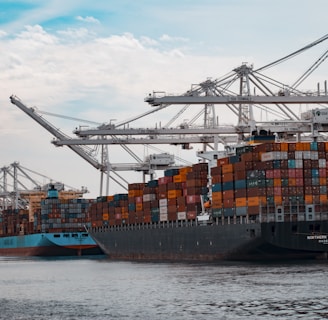China Dominates Indonesia’s Imports Amid Global Trade War
Amid the ongoing trade tensions between the United States and China, Indonesia is experiencing a surge in imports from the world’s second-largest economy. This growing dominance raises new concerns about Indonesia’s trade structure and the risk of early deindustrialization.
MARKET TALK
6/17/20252 min read


The trade conflict between the world’s two economic powerhouses — the United States and China — has caused significant shifts in global trade dynamics. Southeast Asian nations, particularly Indonesia, are now feeling the ripple effects of these tensions. In recent months, the Indonesian market has seen a flood of imported goods from China on an unprecedented scale.
But this is more than just numbers on a customs report. Behind the scenes lies a serious challenge to the resilience of Indonesia’s domestic industries and its long-term global competitiveness.
📈 China’s Exports to ASEAN Soar
According to a recent report by Citigroup Inc., citing official data from the China General Administration of Customs (GACC), China’s exports to ASEAN countries reached US$51.3 billion in May 2025 — marking a 13% increase year-on-year.
🇮🇩 Indonesia Sees the Sharpest Import Growth
Indonesia posted the highest import increase in the region. In May 2025 alone, the country imported goods worth US$6.8 billion from China, a significant 21.43% year-on-year growth. Over the course of 2024, total imports from China reached US$62.88 billion, accounting for 31.13% of Indonesia’s total imports — cementing China’s position as Indonesia’s top import partner.
⚖️ Structural Imbalance in Trade
According to Yusuf Rendy Manilet, an economist at CORE Indonesia, this surge in Chinese imports highlights a deep structural imbalance. China holds a significant advantage in terms of production scale, cost efficiency, and government support — especially through investments in research, technology, and logistics.
In contrast, Indonesia’s exports are still heavily reliant on raw commodities, which are vulnerable to global price fluctuations and have yet to trigger substantial growth in the country’s manufacturing base.
⚠️ Early Signs of Deindustrialization
Muhammad Rizal Taufikurahman, Head of Macroeconomics and Finance at INDEF, warns that the continued influx of cheap Chinese goods — ranging from electronics and textiles to consumer products — could accelerate deindustrialization in Indonesia. Without stronger protection for domestic industries, the local market may be overwhelmed, leaving national producers at a growing disadvantage.
Indonesia now faces a pivotal decision: to embrace the global trade wave without safeguards or to fortify its own industrial base. The dominance of Chinese imports is not a short-term anomaly — if left unchecked, its impact could stretch across decades.
Boosting industrial efficiency, reforming logistics, investing in innovation, and implementing trade policies that support domestic production are all critical steps that must be taken immediately.
Is your business ready to face the wave of low-cost imports?
SSA Group works with partners to craft adaptive strategies that help them survive and thrive in today’s volatile global landscape.
Reach out to us for a strategic discussion tailored to your industry.
Satra Sinar Abadi Group

Connect with Us
Consult
📧 Email: hello@satrasinar.com
📱 WhatsApp: +62-821-1002-6009
🌐 Website: www.satrasinar.com
© 2025. All rights reserved.
Follow us:
